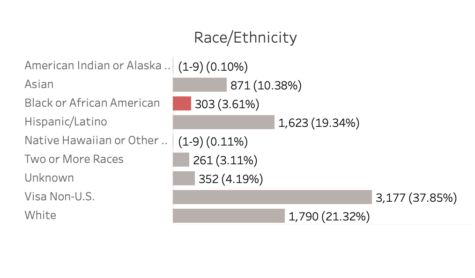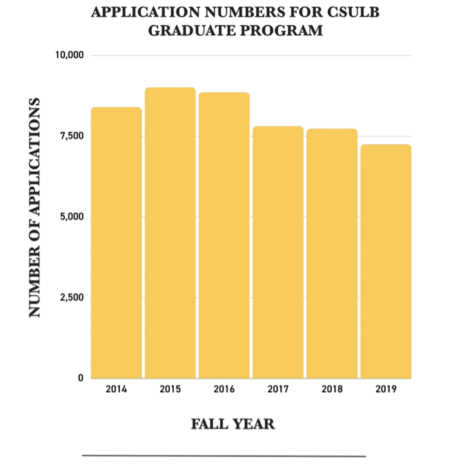Long Beach State had 7,238 students enrolled in graduate studies in 2019, the lowest number in the past five years.
Of those enrolled in the fall semester, 31.31% were Latino, closely resembling the demographics of undergraduate studies at 40.2%.

These numbers directly contradict the national average, however. According to data from the National Center for Education Statistics, 53.33% of graduate students in the United States are white, yet only 21.55% of CSULB graduate students are white.
The diversity of the graduate program at CSULB hasn’t always been ahead of the national average.
In 2014, Visa Non-U.S. students made up 37.85% of the population, with white students coming in second at 21.32%. Latino students only made up 19.34% of the population at the time.
It wasn’t until 2016 that Latino students began to make up more of the graduate population, accounting for 23.10% of those studying at CSULB. Over the next three years, the population continued to increase to its current level.
In line with undergraduate studies, Black students made up the smallest population of graduate students at just 4.24% in 2019. Undergraduate populations are less than 4%.
This is the highest the population has been in five years but is still above the national average, according to data from the NCES. Less than 1% of graduate students in America are Black.
The Asian student population has seen a steady increase since 2014, growing from 10.38% to 14.44% the past five years.
In an effort to promote diversity in the university’s graduate program, CSULB’s Senior Communications Strategist Juliet Hidalgo said that President Jane Close Conoley along with the university’s “senior leadership has been laser-focused on equity on campus for all.”
She maintained that Conoley’s Equity and Action Report includes “goals for CSULB’s current and future Black students,” such as having more entry possibilities through programs like Beach Pathways, Long Beach College Promise and Upward Bound.
Other goals include increased fundraising for scholarships “that support internships and studies in social and racial justice,” Hidalgo said, as well as investing in cultural conferences and programs and “enhanced mentoring for diverse students.”
Likewise, CSULB maintains the national average of having a larger female population than males in graduate school with 62.21% of those seeking a post-baccalaureate degree in 2019. Women have maintained a larger percentage of enrollment since 2014.

Overall, however, the population in graduate school is down, with just 7,238 enrolled in 2019 — the lowest rate in five years. Fall 2015 saw the highest rate of enrollment with 9,005 students.
The Department of Health and Human Services maintains the majority of enrollment in graduate school with a consistently more than 37% of students studying for careers in nursing and the pharmaceutical and nutrition industries.
According to Jody Cormack, vice provost for academic programs and dean of Graduate Studies, and Bryan Rodriguez, director of Graduate Studies Resource Center, “CSULB does actively recruit students from underserved and underrepresented communities to continue to advanced degrees,” including through the CSULB BUILD Program, or Building Infrastructure Leading to Diversity.
CSULB BUILD “offers intensive research training for undergraduate students interested in pursuing graduate study and exploring careers in health-related research from the Colleges of Engineering, Health and Human Services, Liberal Arts and Natural Sciences and Mathematics,” according to campus officials.
“All qualified applicants are considered, and we strongly encourage applications from students from groups traditionally underrepresented in the health-related research workforce, such as first-generation college students, those with financial need, members of racial/ethnic minority groups, students with a disability and students who have encountered life experiences or challenges that can contribute to the diverse perspectives needed in health-related research,” officials said in an email.




